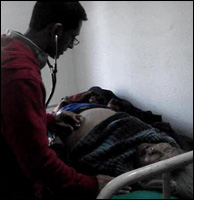Neil Gokal, MD: OMC Family Medicine resident
Nepal: February 2012

My first introduction to healthcare in Nepal came with the realization that political battles of medicine are everlasting. The Jaya Buddha Hospital, a
private not for profit organization in Bharatpur, consists of 20 inpatient beds as well as an operation theatre, emergency room that was in all sense of
the words literally a room, and five rooms devoted to outpatient care. Around the corner was a vastly larger building, the Chitwan Medical College. Though
still undergoing construction, the demand for care has been so forceful that doctors are using the facility and treating both in and outpatients despite
the place not being entirely ready. The common conditions of COPD, asthma, and pneumonia were widely prevalent; however, the number of cases of tuberculosis
in every presentation including Pott's spine (vertebral tuberculosis), Koch's abdomen (peritoneal, cecal, mesenteric tuberculosis), and miliary tuberculosis
was astonishing. Prior to obtaining films or lab results on a ten year old boy with fevers and productive cough for three weeks, the attending instructed
me to gently squeeze the child's chest with one hand on his back and the other on his chest. The sensation of squeezing bubble wrap was indicative of the
cavitations caused by miliary tuberculosis. Lack of awareness and education has contributed to increasing cases of hypertension and diabetes. Hearing the
translated versions of the DASH diets and promoting walking with face masks versus using buses and motorbikes was an interesting but understandable twist
on advocating for patients health. The patients themselves manage their own health records in that they carry books in which doctors will write notes
wherever they go. The aim is to minimize repeat testing in a society that cannot afford to do many of these tests in the first place. The idea though
simplistic could very well be applied at home with quite efficacious results.
The opportunity to explore this culture, society, and people and appreciate the fruitfulness of their efforts with the resources available is profound. I
left Nepal feeling rejuvenated, inspired, and, indeed, born again. I remember each vivid experience daily, and I look forward to my return.